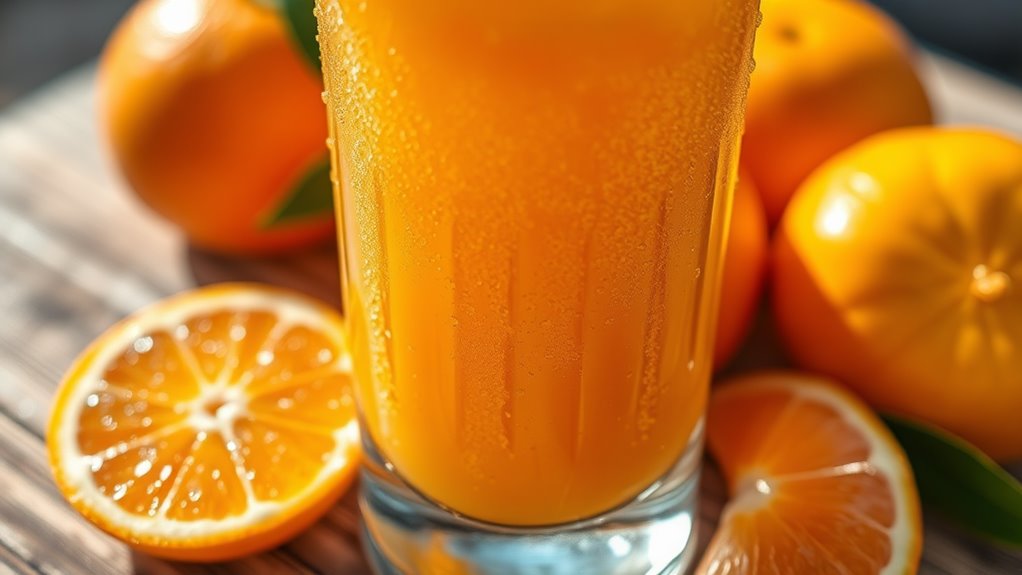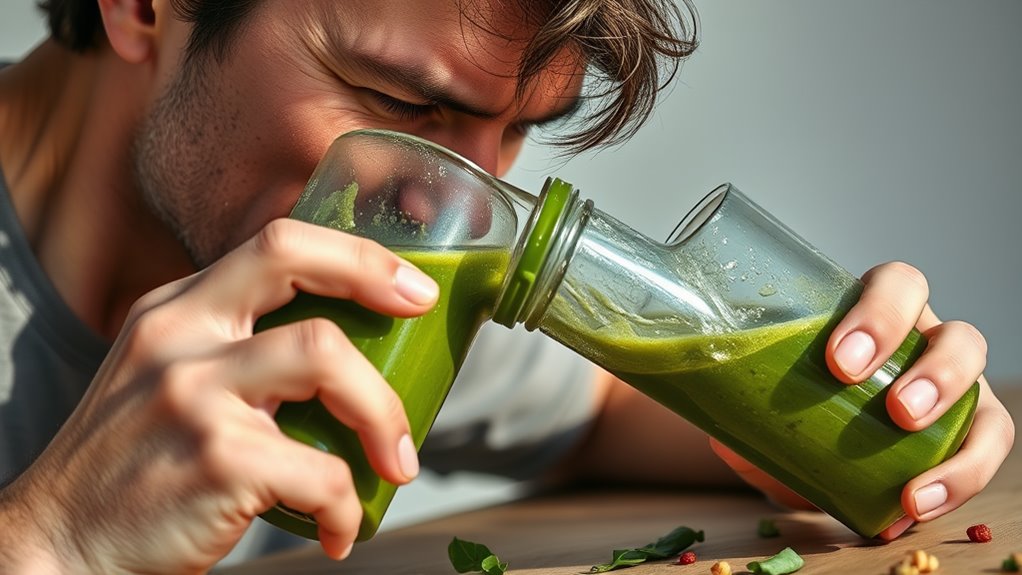10 Biggest Weight Loss Lies You Still Believe!
You might still believe common weight loss myths, like thinking skipping meals helps you shed pounds faster or that all calories are equal. Many view carbs as their enemy, but they’re essential for energy. Exercising for hours isn’t necessary; the quality of workouts matters more. Fat-free foods can be deceiving too, often loaded with sugars. If you think the scale’s your only measure of success, you’re missing out on other vital indicators. There’s much more to discover!
Skipping Meals Helps You Lose Weight Faster
Although it might seem logical that skipping meals could speed up weight loss, it often backfires and can hinder your progress. When you deprive yourself of food, your body enters starvation mode, slowing down your metabolism to conserve energy.
You might think you’re cutting calories, but you’re actually setting yourself up for binge eating later. Missing meals can lead to intense cravings, making it harder to stick to a healthy eating plan.
Furthermore, the nutrients you miss out on can negatively impact your energy levels and overall well-being. Instead of skipping meals, focus on balanced, nutrient-dense options that support your weight loss goals.
Mastering portion control and meal timing will yield far better results than starvation ever could.
All Calories Are Created Equal
While it might seem intuitive that all calories contribute equally to weight loss, the truth is far more complex. The source of your calories matters significantly.
For instance, 100 calories from a candy bar don’t impact your body the same way as 100 calories from broccoli. The nutritional quality, macronutrient composition, and how your body processes these calories all play crucial roles.
Whole foods tend to be more satiating and nutrient-dense, helping you manage hunger and cravings better. On the other hand, processed foods may lead to overeating and poor nutritional choices.
To master your weight loss journey, focus on the quality of your calories, not just the quantity. Prioritize foods that nourish your body and support sustainable weight management.
Carbs Are the Enemy
Carbohydrates often get a bad rap in the weight loss conversation, leading many to believe they’re the primary culprit behind weight gain.
In reality, carbs are an essential energy source that fuels your body and brain. It’s not the carbs themselves that sabotage your efforts; it’s the type and quantity you consume.
Whole grains, fruits, and vegetables provide vital nutrients and fiber, supporting your weight loss journey. Instead of fearing carbs, focus on choosing high-quality options and managing portion sizes.
Balance is key. When you understand how to incorporate carbs wisely, they can actually enhance your performance and satisfaction.
Embrace carbs as allies, not enemies, and watch how they can complement your overall wellness strategy.
You Need to Exercise for Hours Daily
Many people believe that to achieve weight loss, they must spend hours in the gym each day, sweating excessively to see results. However, this myth can hinder your progress.
Quality trumps quantity when it comes to exercise. Short, intense workouts can be just as effective, if not more so, than lengthy sessions. High-Intensity Interval Training (HIIT) or strength training can boost your metabolism and burn calories efficiently in less time.
Additionally, incorporating movement into your daily routine—like walking or cycling—can complement your fitness efforts without overwhelming you.
Focus on consistency and variety instead of clocking hours at the gym. Remember, it’s about creating sustainable habits that fit your lifestyle, not about exhausting yourself for hours.
Fat-Free Foods Are Always Healthier
Though you might think that fat-free foods are the best choice for your health, this isn’t always the case. Many fat-free products replace fat with added sugars or artificial ingredients, which can lead to weight gain and health issues. Understanding the nutritional content is crucial.
| Food Type | Fat Content | Added Sugars |
|---|---|---|
| Fat-Free Yogurt | 0g | 15g |
| Fat-Free Salad Dressing | 0g | 5g |
| Fat-Free Cookies | 0g | 20g |
Always read labels carefully. Opting for whole foods with healthy fats, like avocados and nuts, can be more beneficial than choosing processed fat-free alternatives. Embrace balance and moderation for lasting health.
Supplements Can Replace a Healthy Diet
While it might seem tempting to rely on supplements for your nutritional needs, they can’t truly replace a healthy diet. Whole foods provide essential nutrients in ways that supplements simply can’t replicate. No matter how advanced the supplement, it lacks the complex synergy found in natural foods.
Consider the benefits of a balanced diet:
-
Vitamins and minerals: Obtained more effectively from fruits and vegetables.
-
Fiber: Crucial for digestion, found in whole grains and legumes.
-
Antioxidants: Present in various plant-based foods that combat oxidative stress.
-
Healthy fats: Sourced from nuts and fish, supporting brain health.
You Can Spot Reduce Fat
Relying on supplements can lead to misconceptions about fat loss, particularly the idea that you can spot reduce fat in specific areas of your body.
You might believe that doing endless crunches will eliminate that stubborn belly fat or targeting your thighs will slim them down. However, the truth is, your body decides where it loses fat based on genetics and overall body composition.
Spot reduction isn’t supported by science. Instead, focus on a holistic approach: consistent strength training, cardiovascular exercise, and a balanced diet.
This strategy promotes overall fat loss, allowing your body to naturally shed fat from all areas, including those you’re most concerned about.
Embrace the journey, and you’ll achieve lasting results without the frustration of spot reduction myths.
The Scale Is the Only Measure of Success
Many people mistakenly believe that the scale is the sole indicator of their weight loss progress. Relying solely on numbers can lead to frustration and misinterpretation of your journey.
Remember, the scale doesn’t capture the full picture. Focus on these other vital measures of success:
-
Body Measurements: Track inches lost around your waist, hips, and other areas.
-
Fitness Levels: Notice improvements in strength, endurance, and overall performance.
-
Clothing Fit: Pay attention to how your clothes fit and feel as you progress.
-
Energy Levels: Observe increases in energy and mood as your health improves.
Embrace a holistic view of success, and you’ll find motivation beyond just the numbers on the scale.
Drinking Water Alone Will Make You Lose Weight
Focusing on the scale can lead to misconceptions about weight loss, such as the belief that simply drinking water will lead to significant weight loss.
While staying hydrated is crucial for overall health and can aid in metabolic processes, it won’t magically melt away fat. Water can help control appetite and may replace high-calorie beverages, but it’s not a standalone solution.
To achieve lasting weight loss, you need a balanced approach that includes a healthy diet and regular exercise. Relying solely on water might leave you frustrated and stagnant on your journey.
Instead, make hydration part of a comprehensive strategy, where you combine it with smart food choices and consistent physical activity for effective results.
Weight Loss Is a Quick Fix
Although it might be tempting to think weight loss can happen overnight, the reality is that sustainable changes take time and effort.
Quick fixes, like fad diets, often lead to temporary results, leaving you frustrated and back where you started.
Mastering weight loss requires a commitment to long-term habits.
Focus on these key strategies:
- Balanced Nutrition: Prioritize whole foods over processed options.
- Regular Exercise: Incorporate both cardio and strength training into your routine.
- Mindful Eating: Pay attention to hunger cues and portion sizes.
- Consistent Monitoring: Track your progress to stay accountable and make adjustments.
Embrace the journey, and remember that lasting change is built step by step, not overnight.
Frequently Asked Questions
Can Stress Affect My Weight Loss Journey?
Yes, stress can significantly impact your weight loss journey. It triggers hormonal changes that may lead to cravings and hinder fat loss. Managing stress through mindfulness and exercise can help keep you on track.
How Does Sleep Impact Weight Management?
Sleep significantly impacts your weight management. When you sleep well, your body regulates hormones that control appetite and metabolism. Prioritizing quality sleep helps you make better choices and boosts your overall weight loss efforts.
Are All Fats Bad for My Health?
Not all fats are bad for your health. In fact, healthy fats, like those from avocados and nuts, can support your body’s functions. Focus on incorporating these beneficial fats while avoiding trans fats for optimal health.
What Role Does Hydration Play in Weight Loss?
Hydration’s crucial for weight loss. It helps control appetite, boosts metabolism, and aids digestion. When you’re well-hydrated, your body functions optimally, making it easier to shed those extra pounds and maintain your energy levels.
Can Emotional Eating Sabotage My Diet?
Emotional eating can definitely sabotage your diet. When you turn to food for comfort, you might overlook your hunger cues and make unhealthy choices, undermining your weight loss goals. Stay mindful and seek healthier coping strategies.






